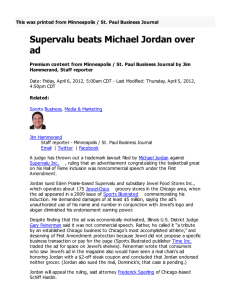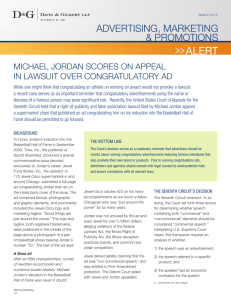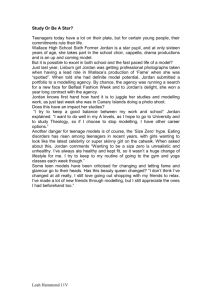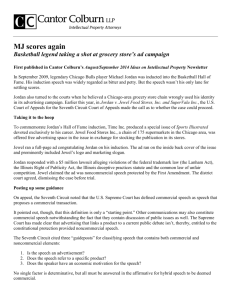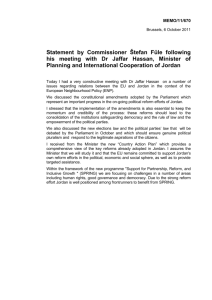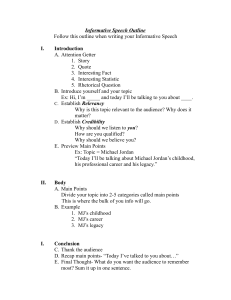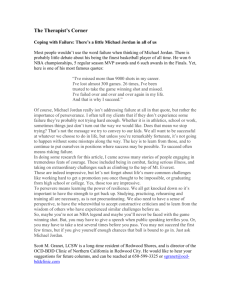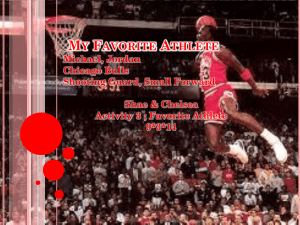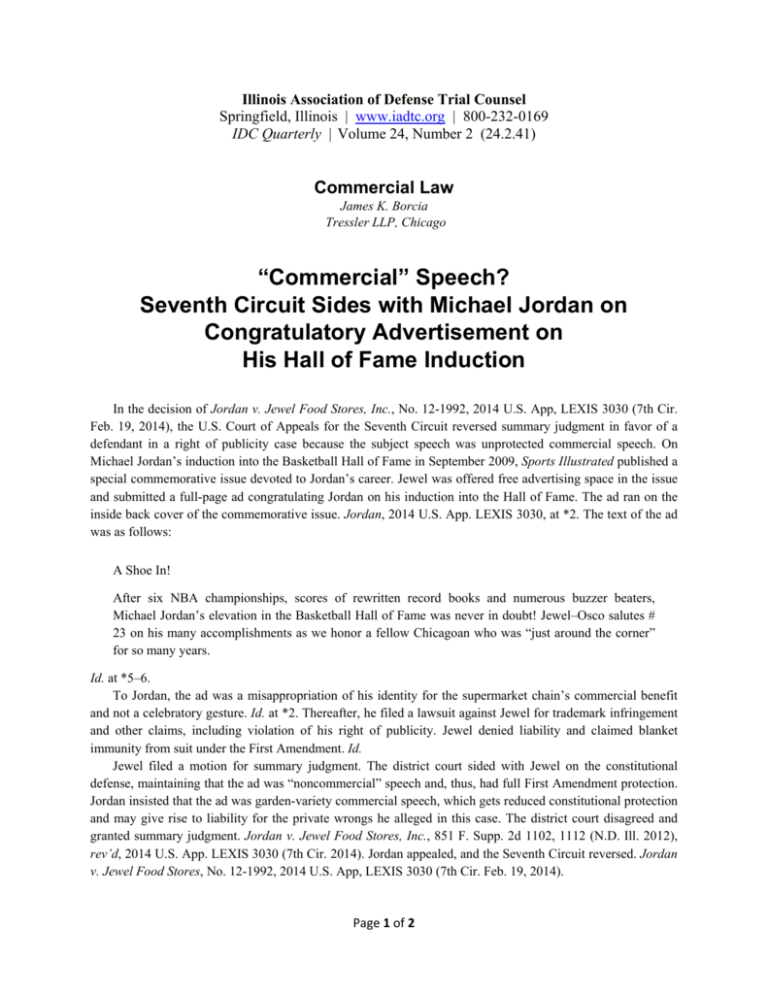
Illinois Association of Defense Trial Counsel
Springfield, Illinois | www.iadtc.org | 800-232-0169
IDC Quarterly | Volume 24, Number 2 (24.2.41)
Commercial Law
James K. Borcia
Tressler LLP, Chicago
“Commercial” Speech?
Seventh Circuit Sides with Michael Jordan on
Congratulatory Advertisement on
His Hall of Fame Induction
In the decision of Jordan v. Jewel Food Stores, Inc., No. 12-1992, 2014 U.S. App, LEXIS 3030 (7th Cir.
Feb. 19, 2014), the U.S. Court of Appeals for the Seventh Circuit reversed summary judgment in favor of a
defendant in a right of publicity case because the subject speech was unprotected commercial speech. On
Michael Jordan’s induction into the Basketball Hall of Fame in September 2009, Sports Illustrated published a
special commemorative issue devoted to Jordan’s career. Jewel was offered free advertising space in the issue
and submitted a full-page ad congratulating Jordan on his induction into the Hall of Fame. The ad ran on the
inside back cover of the commemorative issue. Jordan, 2014 U.S. App. LEXIS 3030, at *2. The text of the ad
was as follows:
A Shoe In!
After six NBA championships, scores of rewritten record books and numerous buzzer beaters,
Michael Jordan’s elevation in the Basketball Hall of Fame was never in doubt! Jewel–Osco salutes #
23 on his many accomplishments as we honor a fellow Chicagoan who was “just around the corner”
for so many years.
Id. at *5–6.
To Jordan, the ad was a misappropriation of his identity for the supermarket chain’s commercial benefit
and not a celebratory gesture. Id. at *2. Thereafter, he filed a lawsuit against Jewel for trademark infringement
and other claims, including violation of his right of publicity. Jewel denied liability and claimed blanket
immunity from suit under the First Amendment. Id.
Jewel filed a motion for summary judgment. The district court sided with Jewel on the constitutional
defense, maintaining that the ad was “noncommercial” speech and, thus, had full First Amendment protection.
Jordan insisted that the ad was garden-variety commercial speech, which gets reduced constitutional protection
and may give rise to liability for the private wrongs he alleged in this case. The district court disagreed and
granted summary judgment. Jordan v. Jewel Food Stores, Inc., 851 F. Supp. 2d 1102, 1112 (N.D. Ill. 2012),
rev’d, 2014 U.S. App. LEXIS 3030 (7th Cir. 2014). Jordan appealed, and the Seventh Circuit reversed. Jordan
v. Jewel Food Stores, No. 12-1992, 2014 U.S. App, LEXIS 3030 (7th Cir. Feb. 19, 2014).
Page 1 of 2 The parties agreed that if Jewel’s ad was “noncommercial speech” in the constitutional sense, then the
First Amendment provided a complete defense to all claims in the suit. The Seventh Circuit noted that it was
unsure that was correct but, because the parties agreed, left that issue for another day. To determine whether
speech falls on the commercial or noncommercial side of the constitutional line, the court defined commercial
speech to mean “speech that proposes a commercial transaction.” Jordan, 2014 U.S. App. LEXIS 3030, at *15.
The court noted the following guideposts for classifying speech that contains both commercial and
noncommercial elements, including “whether: (1) the speech is an advertisement; (2) the speech refers to a
specific product; and (3) the speaker has an economic motivation for the speech.” Id. at *19.
Jewel argued that its ad did not propose a commercial transaction and, therefore, could not be deemed
commercial speech. The Seventh Circuit, however, held that the commercial-speech category is not limited to
speech that directly or indirectly proposes a commercial transaction. Although the textual focus of Jewel’s ad
was a congratulatory salute to Jordan on his induction into the Hall of Fame, the ad prominently featured the
“Jewel-Osco” logo and marketing slogan, which were creatively and conspicuously linked to Jordan in the text
of the ad’s congratulatory message. The court found that, based on its content and context, the ad was classified
properly as a form of image advertising aimed at promoting the Jewel-Osco brand. The court also found that that
Jewel’s ad served two purposes: congratulating Jordan on his induction into the Hall of Fame and promoting
Jewel’s supermarkets. Id. at *21. The court noted that the latter commercial message was implicit, but easily
inferred, and was the dominant one. Although no specific product or service is offered, the ad generally promoted
patronage at Jewel-Osco stores. The court, thus, found that the ad was commercial speech and subject to the laws
invoked by Jordan. Id. at *26.
The court concluded that a “contrary holding would have sweeping and troublesome implications for
athletes, actors, celebrities, and other trademark holders seeking to protect the use of their identities or marks”
because image advertising is commonplace. Id. at 27. Rather than expressly selling particular products, this
type of advertising “features appealing images and subtle messages alongside the advertiser’s brand name or
logo with the aim of linking the advertiser to a particular person, value, or idea in order to build goodwill for
the brand.” Id.
The Seventh Circuit was careful to note that its specific holding applied to the ad at issue in the case. It
specifically stated that “it was not suggesting that a company cannot use its graphic logo or slogan in an
otherwise noncommercial way without transforming the communication into commercial speech.” Id. at 29.
Despite the narrowing of this holding, advertisers need to be aware of this decision when engaging in these types
of promotional activities. If there is any doubt, the safest course is to obtain permission from the person being
congratulated or referenced in the promotional materials.
About the Author
James K. Borcia is a partner with the Chicago firm of Tressler LLP, and is active in the firm’s litigation practice with an emphasis on
commercial and complex litigation. He was admitted to the bar in 1989 after he received his J.D. from Chicago-Kent College of Law.
Mr. Borcia is a member of the Chicago and Illinois State Bar Associations, as well as the IDC and DRI.
About the IDC
The Illinois Association Defense Trial Counsel (IDC) is the premier association of attorneys in Illinois who devote a substantial portion their
practice to the representation of business, corporate, insurance, professional and other individual defendants in civil litigation. For more
information on the IDC, visit us on the web at www.iadtc.org.
Statements or expression of opinions in this publication are those of the authors and not necessarily those of the association.
IDC Quarterly, Volume 24, Number 2. © 2014. Illinois Association of Defense Trial Counsel. All Rights Reserved. Reproduction in whole or in
part without permission is prohibited.
Illinois Association of Defense Trial Counsel, PO Box 588, Rochester, IL 62563-0588, 217-498-2649, 800-232-0169, idc@iadtc.org
Page 2 of 2

